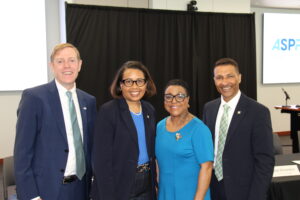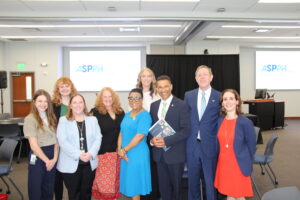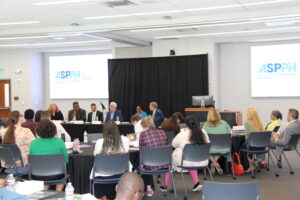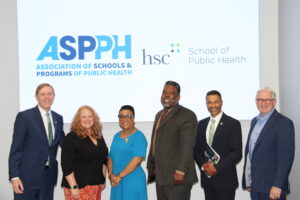Association of Schools and Programs of Public Health brings inaugural community outreach event to HSC campus
May 16, 2024 • News
By Katie Biggar and Sally Crocker
 On May 8th, the College of Public Health at The University of North Texas Health Science Center at Fort Worth, collaborated with the Association of Schools and Programs of Public Health (ASPPH) to bring public health advocates together both virtually and in-person. The event, titled “Framing the Future: Fostering Community Partnerships for a Healthier World,” focused on the pressing need for strategic community partnerships in shaping the future of public health professionals.
On May 8th, the College of Public Health at The University of North Texas Health Science Center at Fort Worth, collaborated with the Association of Schools and Programs of Public Health (ASPPH) to bring public health advocates together both virtually and in-person. The event, titled “Framing the Future: Fostering Community Partnerships for a Healthier World,” focused on the pressing need for strategic community partnerships in shaping the future of public health professionals.
Dr. Linda Alexander, ASPPH chief academic officer, laid the foundation for a panel discussion by drawing insights from the ASPPH Framing the Future 2030 report, stressing the necessity of authentic and equitable relationships in the realm of public health.
 |
 |
 |
Guided by Tim Leshan, ASPPH chief external relations and advocacy officer, the panel covered details regarding practical strategies for fostering meaningful partnerships with communities and organizations.
Dr. Emily Spence, CPH associate dean for community engagement and health equity, and Dr. Shafik Dharamsi, CPH dean, shared insights into HSC’s Community Corps model, which is currently being developed to strengthen multi-sector partnerships and provide organizational support to advance community-driven solutions and workforce development, showcasing collaborative efforts with local community partners.
CPH alumnus Dr. Matt Richardson, Health Director at Denton County Public Health, and Dr. Carlos Walker from the Family Action Center at Fort Worth ISD, reaffirmed the pivotal role of community engagement in shaping public health decisions, emphasizing inclusivity and community involvement in crafting effective interventions for healthier communities.
“The groundwork is already underway, but what truly matters is listening to the community first. Providing community members with the opportunity to voice their concerns is vital. Too often, community members feel unheard; they don’t want solutions imposed on them. Building trust begins with active listening and understanding their lived experiences,” Dr. Walker said.
The conversation highlighted successful strategies for building trust and promoting public health values, demonstrating the collaborative spirit between HSC and ASPPH in addressing public health challenges. Articulating a shared commitment to fostering sustainable and equitable relationships with communities, the panelists advocated for prioritizing strategic shared initiatives.
Dr. Spence shed light on CPH’s approach to cultivating lasting partnerships, stating, “Our aim is to establish structures and practices that foster permanent relationships, including intentional integration of community partners into our curriculum and eventually co-teaching courses with them. We also aspire to develop joint positions with organizations, aligning mutual interests to create shared job roles.”
ASPPH’s report, “Framing the Future: Fostering Community Partnerships for a Healthier World,” advocates for a shift in academic public health roles toward supporting sustainable partnerships and enhancing collaborative skills through curriculum development.
“I am thrilled that our strategic plan – IMPACT 2030: Commitment to Community – mirrors ASPPH’s ‘Framing the Future’ guidance,” Dr. Spence said. “Our goal is to serve as an example, showcasing how we’re integrating community engagement into our work. We are eager to continue partnering with ASPPH and share our experiences authentically, including our successes and challenges.”
During the event, ASPPH also recognized the 25th anniversary of the HSC College of Public Health. The CPH celebrates a long history dating back to 1999.
“Robust collaborations with community and health sector partners are crucial for ensuring that our education, research and service efforts effectively address population health needs and promote health equity,” Dr. Dharamsi said.
“Participating in these types of important national dialogues around the future of public health education is so important,” he added, “and we are very pleased to have served as a co-host for this ASPPH event. We look forward to partnering further with ASPPH in the future.”


Social media